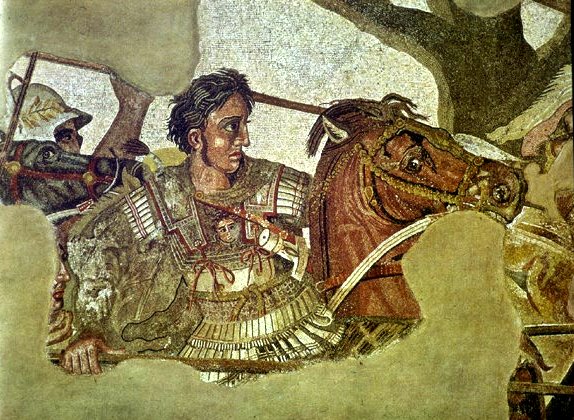Alexander the Great

How can we separate the legend from the historical reality?
How do we separate the myth from the man?
Was Alexander skillful or lucky or a bit of both?
How much of the Hellenistic legacy did he intend?
A vast body of writing about Alexander the Great seems to have mysteriously disappeared. We may speculate that . . . history fell victim to partisan uses in an age when cultural consensus was weakening. Here is another fine line the historian must always walk, the line between objectivity and commitment.
Heritage and Challenge (1989)
Direct evidence for Alexander's career is . . . scarce or problematic. What we have is an enormous amount of secondary evidence. The factual and chronological framework can be reconstructed with reasonable consistency: interpretation remains somewhat poorly based, and even on major historical issues . . . . But enough is left to leave no doubt that in dealing with Alexander we are dealing with one of very few individuals in history who can truly be said to have changed the world irrevocably.
Alexander the Great (1997)
"Young Alexander rode in from the west," as the story goes, and it has gone on to inspire more than two millennia of myth and romance. The truth is that he would have ridden straight out again if Persia had adopted the right strategy. Persia could have beaten Macedon, but its leader made the wrong choices.
The Anatomy of Error (1990)
Alexander is one of the most puzzling great figures in history. Historians relying on the same sources give vastly different pictures of him. Some portray him as an idealistic visionary and others as a ruthless Machiavellian.
Western Civilization (1996)
Believing that he had come from the gods to be a governor and reconciler of the universe. . . he harnessed all resources to one and the same end, mixing as it were in a loving-cup the lives, manners, marriages and customs of men. He ordered them all to regard the inhabited earth as their fatherland and his armed forces as their stronghold and defense.
Plutarch (2nd c. A.D.)
a positively rose-tinted aura surrounds Alexander, the leader of one of the most successful wars of imperial aggrandizement, pursued wholly for gain and glory. . . .
He has become divorced from history and elevated into a symbol, the type of military invincibility and the culture hero with a mission to propagate Hellenic values world-wide.
Alexander the Great and the East (1996)
The narratives which survive were written between three and five centuries after Alexander's career, and their portrayals of Alexander vary widely not only in what might be regarded as matters of fact but also in interpretations of Alexander's personality.
The Genius of Alexander the Great (1997)
Historians of Alexander
1) Johann G. Droysen (1877)
Philip & Alexander as the Bismarcks of their age
-acting according to divine plan; unify the world
-Hellenic leadership; spread spirit of Greek polis
2) Fritz Schachermeyr (1940)
Alexander as dangerous race mixer
-Nazi-influenced racial interpretation
-mixing cultures; "Chaos of Blood"
3) William W. Tarn (1948)
Alexander as heroic character who could do no wrong
-mission: bring Greek culture to rest of world
-blend all mankind in unity & brotherhood
4) Ernst Badian (1958)
Alexander as thoroughgoing tyrant, ruthless & cruel
-deeply influenced by Nazi's rise to power
-evil monarch, few redeeming qualities
-did not have mission to spread Greek culture
5) Robin Lane Fox (1973), Peter Green (1974)
Alexander as brilliant & ruthless commander
-warts-and-all approach
-he came to believe in his own myth
[Today] the verdict of history is harsher. A man, broken in the end, by the loneliness and insanity of absolute power Is that how we should see Alexander's career now, a self destructive madness rather than everlasting glory?
I'll tell you what I think for what it's worth . . . all the evils unleashed by men of war in our own time teach us that we should reject Alexander's ideals. But Alexander was a man of his time, not of ours. He believed in the gods and he would have accepted their verdict, both for good and ill. If he could answer us now I'm sure he would say, like the tragic hero that he is, "Let the gods be my judges, for in every sign that they gave me, they told me no lies."
Michael Wood, "In the Footsteps of Alexander the Great" (1998)

